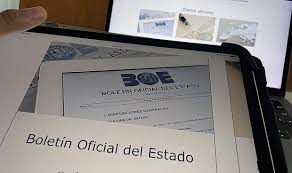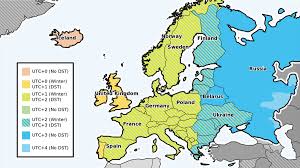Changing our clocks and watches twice a year is to become a thing of the past - in Spain at least
By Paul Whitelock
 The farce of putting the clocks back in Autumn and forward in the Spring is to come to an end, at least in Spain. This change was introduced in the UK during the first world war to allow more daylight working hours. And it’s never been changed since.
The farce of putting the clocks back in Autumn and forward in the Spring is to come to an end, at least in Spain. This change was introduced in the UK during the first world war to allow more daylight working hours. And it’s never been changed since.
As for Spain, their time used to be based on Greenwich Mean Time (GMT) like the UK and Portugal, but General Franco was pressurised to change to European Central Time (ECT) by Adolf Hitler around the time of the Spanish Civil War. Since then, Spain has been out of step.
Background
 On October 27, Spain will put its clocks back one hour, signalling the start of winter. However, this practice of adjusting the time has its days numbered.
On October 27, Spain will put its clocks back one hour, signalling the start of winter. However, this practice of adjusting the time has its days numbered.
Under current regulations, 2026 will be the last year in which Spaniards modify their clocks and watches, ending a practice that has been in place since the 1970s.
This discrepancy between the official time and daylight has generated criticism, as it affects the biological cycles of the population and complicates the balance between personal and working life.
Returning to Greenwich Mean Time (GMT) is still an option, but it would imply significant adjustments in daily habits.
Moving forward in Spain
For now, the debate on which time to choose will remain on the public agenda. Everything points to Spain preparing to say goodbye to the time change, joining other countries that have already decided to adjust their clocks for the last time.
Since 1974, the main reason for moving clocks forward or backward has been to take advantage of natural light and reduce energy consumption. However, recent studies indicate that the impact of this measure is minimal at present, which has led to questions about its usefulness.
 Despite the doubts, the Boletin Oficial del Estado (BOE) [Official State Gazette] has confirmed that the transition between winter and summer time will be maintained until 2026, as established by Royal Decree 236/2002.
Despite the doubts, the Boletin Oficial del Estado (BOE) [Official State Gazette] has confirmed that the transition between winter and summer time will be maintained until 2026, as established by Royal Decree 236/2002.
After that date, Spain will have to decide whether to adopt a fixed schedule and, if so, whether it prefers a summer or a winter timetable. This measure not only requires political consensus, but also a massive information campaign to avoid confusion among the populace.
 The decision to stop changing the time has also reignited another discussion: Spain's time zone. According to its geographical location, the country should be governed by the Greenwich Meridian (GMT), as is the case in the United Kingdom and Portugal.
The decision to stop changing the time has also reignited another discussion: Spain's time zone. According to its geographical location, the country should be governed by the Greenwich Meridian (GMT), as is the case in the United Kingdom and Portugal.
Until 1940 it was so, until Francisco Franco, under pressure from Adolf Hitler, adopted Central European Time (CET) to align with other countries on the European continent.
Conclusion
So, the farce of changing the clocks in Spain is to end in 2026, and not before time (excuse the play on words!). The question is will Spain revert to GMT where it belongs, alongside the UK, Ireland, Portugal and its own Canary Islands?
It should do that, in my opinion.
© Paul Whitelock
Acknowledgements:
Boletin Oficial del Estado
Daniela Machorro
Facebook
Mundo Deportivo
Time and Date
Torrevieja.com
Wikipedia
Tags:
Adolf Hitler, Boletin Oficial del Estado, Canary Islands, Daniela Machorro, ECT, European Central Time, Facebook, General Franco, GMT, Greenwich Mean Time, Ireland, Mundo Deportivo, Paul Whitelock, Portugal, putting the clocks back in Autumn, putting the clocks forward in Spring, Royal Decree 236/2002, Spanish Civil War, Time and Date, Torrevieja.com, UK